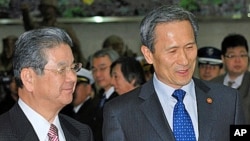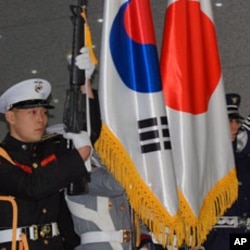South Korea and Japan have held their first talks on creating unprecedented agreements to share military intelligence and equipment. It is something the United States has encouraged because of recent attacks blamed on North Korea and Pyongyang’s continuing nuclear threat. But both Seoul and Tokyo may find it necessary to move cautiously because of historical legacies and concern about how Beijing will react.
The defense ministers of South Korea and Japan stood side by side, facing an honor guard while a military band plays inside the Defense Ministry in Seoul.
This scene one day might be remembered as symbolizing a new era in the long-complicated relationship between the Asian neighbors.
Going back through the centuries, Japan and Korean kingdoms have forged alliances and fought wars against each other. The entire peninsula came under Japanese occupation a century ago, lasting until the end of World War II.
Despite lingering animosity among Koreans about Japanese colonial rule and an unresolved territorial dispute over tiny islands in valuable fishing grounds, the two countries have forged a trading partnership and renewed cultural ties. But the diplomatic and defense relationship is less mature.
Their mutual ally, the United States, however, nudged both to explore a direct military relationship in recent months, following Communist North Korea’s acts of aggression.
The visit of Japanese Defense Minister Toshimi Kitazawa this week was the first significant step to discuss that idea.
Kitazawa, sitting across from South Korea’s defense chief, says North Korean provocations, which have undermined regional peace and security, will no longer be tolerated.
It was tough language not usually heard from the Japanese since World War II.
Left unsaid was disappointment in East Asia over Beijing’s reluctance to criticize Pyongyang after it shelled a South Korean island in November.
South Korean Defense Minister Kim Kwan-jin indicated to Kitazawa the time has arrived for stronger defense ties.
Kim says that security cooperation between the two nations, for the pursuit of regional security and peace, will be emphasized further in the years to come.
Kim Chang-su, a senior research fellow at South Korea’s Institute for Defense Analyses, says it makes sense.
"We really need to exchange more information with Japan directly instead of just going through the United States, which has been the case for the last 20 years, because Japan and [South] Korea are both allies of the United States," Kim stated.
Possible agreements could lead to sharing intelligence about North Korea’s nuclear and other weapons programs, exchanging military supplies and consolidating a framework for ballistic missile defense among South Korean, Japanese and U.S. forces.
The United States maintains military bases and troops in both countries.
Analyst Kim thinks some deals will get done.
"I'm optimistic,” Kim said. “It's very essential because we are two major regional players. And the fact that we don't have this kind of agreement is kind of puzzling to me."
While some officials in Tokyo and Seoul express optimism at least one pact could be signed by the end of this year, others predict a more cautious time line for a comprehensive relationship, possibly extending a decade.
Some South Koreans, including defense analyst Kim, are very wary of any suggestion this will lead to a formal military alliance.
"There’s only a small number of allied relationships in the world. I don't see any need for South Korea and Japan to sign a new alliance treaty. This is totally excluded from our negotiation. We just want to expand our defense and seek cooperation in our dealings with trans-national security threats," Kim said.
There is a concern about how the largest military power in the region, China, will react to closer defense ties between South Korea and Japan.
Many people in both countries are worried about China’s rising military power.
An editorial in a South Korean newspaper recently cautioned that stronger military cooperation between Seoul and Tokyo could prompt Beijing to adopt an atmosphere of confrontation in Northeast Asia resembling that of the Cold War era.





